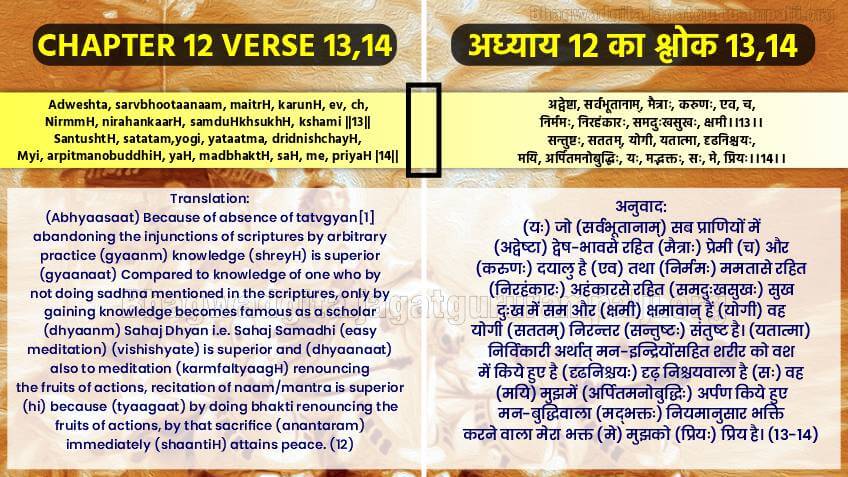
Adweshta, sarvbhootaanaam, maitrH, karunH, ev, ch,
NirmmH, nirahankaarH, samduHkhsukhH, kshami ||13||
SantushtH, satatam,yogi, yataatma, dridnishchayH,
Myi, arpitmanobuddhiH, yaH, madbhaktH, saH, me, priyaH |14||
Translation: (Yah) he who (sarvbhootaanaam) towards all the living beings (adweshta) free from hatred (maitrH) friendly (ch) and (karunH) is compassionate (ev) and (nirmmH) free from affection (nirahankaarH) free from arrogance (samduHkhsukhH) balanced in joy-sorrow (kshami) is forgiving (yogi) that yogi (satatam) always (santushtH) is contented (yataatma) free from defects/vices i.e. with control over body along with mind and senses (dridnishchayH) firmly determined (saH) he (myi) in me (arpitmanobuddhiH) dedicated mind and intellect (madbhaktH) my devotee who does bhakti according to the rules (me) to me (priyaH) is dear. (13, 14)
Translation
He who is free from hatred towards all the living beings, is friendly and compassionate and is free from affection and arrogance, is balanced in joy-sorrow and is forgiving, that yogi is always contented. Free from defects i.e. with control over body along with mind and senses, firmly determined that bhakt of mine with his mind and intellect dedicated to me, who does bhakti according to the rules, is dear to me.
अद्वेष्टा, सर्वभूतानाम्, मैत्राः, करुणः, एव, च,
निर्ममः, निरहंकारः, समदुःखसुखः, क्षमी।।13।।
सन्तुष्टः, सततम्, योगी, यतात्मा, दृढनिश्चयः,
मयि, अर्पितमनोबुद्धिः, यः, मद्भक्तः, सः, मे, प्रियः।।14।।
अनुवाद: (यः) जो (सर्वभूतानाम्) सब प्राणियों में (अद्वेष्टा) द्वेष-भावसे रहित (मैत्राः) प्रेमी (च) और (करुणः) दयालु है (एव) तथा (निर्ममः) ममतासे रहित (निरहंकारः) अहंकारसे रहित (समदुःखसुखः) सुख दुःख में सम और (क्षमी) क्षमावान् हैं (योगी) वह योगी (सततम्) निरन्तर (सन्तुष्टः) संतुष्ट है। (यतात्मा) निर्विकारी अर्थात् मन-इन्द्रियोंसहित शरीरको वशमें किये हुए है (दृढनिश्चयः) दृढ़ निश्चयवाला है (सः) वह (मयि) मुझमें (अर्पितमनोबुद्धिः) अर्पण किये हुए मन-बुद्धिवाला (मद्भक्तः) नियमानुसार भक्ति करने वाला मेरा भक्त (मे) मुझको (प्रियः) प्रिय है। (13-14)
